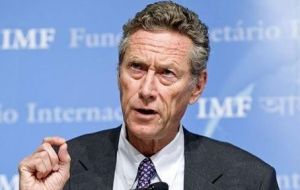MercoPress. South Atlantic News Agency
Even if US tightens liquidity, hot money to emerging economies will continue
 Olivier Blanchard, IMF chief economist
Olivier Blanchard, IMF chief economist Capital flows to emerging markets won’t significantly slow when the US Federal Reserve ends its bond-purchasing program known as quantitative easing, said Olivier Blanchard, chief economist at the IMF.
“QE2 has only a marginal impact on flows,” Blanchard, referring to the Federal Reserve program to stimulate the US economy, told reporters at an IMF-sponsored event in Rio de Janeiro. “As QE2 is phased out I don’t expect it will lead to a significant change in capital flows.”
Blanchard’s remarks contradict the position of Brazilian Finance Minister Guido Mantega, who has complained that the Fed´s asset purchases are causing a flood of “hot money” to emerging markets, fuelling inflation and currency gains. Mantega has repeated that he hopes Fed Chairman Ben S. Bernanke won’t announce another round of quantitative easing.
Blanchard also said that a recent increase in Brazil foreign direct investment is “suspicious,” since investors may be disguising portfolio flows to circumvent government restrictions. FDI inflows exceed economists’ forecasts for a tenth straight month in April.
The country received 23 billion USD in FDI in the first four months of this year, from 7.7 billion USD in the same period in 2010. Foreign investments in shares and domestic bonds fell to 532 USD million from 14.3 billion over the same period.
Brazil’s government suspects “irregularity” in inflows registered as foreign direct investment and may ask the tax agency to open a probe, Estado de Sao Paulo newspaper reported earlier this month.
As part of efforts by the administration of President DilmaRousseff to stem the Real gains, the government on March 29 increased to 6% a tax on new corporate loans and debt sales abroad by banks. A few days later, Rousseff applied the higher tax to renewed, renegotiated, or transferred loans of up to two years in length.
Blanchard, speaking to reporters, said that the share of emerging market assets held by portfolio investors globally still has more room to rise, as faster economic growth in Latin America and Asia attract capital.
He said policy makers should use other instruments -- interest rates, fiscal policy, foreign currency reserves accumulation and other macro-prudential tools -- before resorting to the use of capital controls to fend off ”excessive´´ inflows.
Nicolas Eyzaguirre, the IMF´s Western Hemisphere director and a former finance minister in Chile, said that policy makers in Latin America should be ready to withstand pressure on their currencies in coming years by finding ways to boost productivity and increase savings.
”Make no mistake, there is part of this that is permanent´´ he said at the same event, which brought together central bankers from Thailand, Turkey, Colombia and Chile to discuss capital flows to emerging markets.




Top Comments
Disclaimer & comment rulesCommenting for this story is now closed.
If you have a Facebook account, become a fan and comment on our Facebook Page!